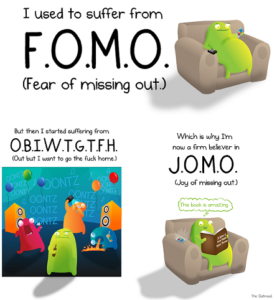Fear of missing out. Over the past few years, I’ve noticed the acronym and what it stands for appears in many peoples’ accounts of their everyday life stress.
To me, it’s b een a long-time given that if I choose to do/ buy/ act X, I automatically rule out other options once I make my choice. It’s part of what I have always accepted as part of living in everyday reality. The focus on FOMO in the media and everyday conversations in the last few years led me to wonder: when did we take on the perspective that, instead of focusing on our reasons for making our choices and learning to get better at selecting the right choice for the right set of circumstances, time and place, the focus should include what we might miss out on (the so-called opportunity cost of economists) [1] ? When we make such a shift, then anxiety is very likely going to arise, and this anxiety has become leveraged by advertisers and social media right across our society. Advertisements show that the anxiety itself has now been accorded a much larger role in attempts to influence our decision-making.
een a long-time given that if I choose to do/ buy/ act X, I automatically rule out other options once I make my choice. It’s part of what I have always accepted as part of living in everyday reality. The focus on FOMO in the media and everyday conversations in the last few years led me to wonder: when did we take on the perspective that, instead of focusing on our reasons for making our choices and learning to get better at selecting the right choice for the right set of circumstances, time and place, the focus should include what we might miss out on (the so-called opportunity cost of economists) [1] ? When we make such a shift, then anxiety is very likely going to arise, and this anxiety has become leveraged by advertisers and social media right across our society. Advertisements show that the anxiety itself has now been accorded a much larger role in attempts to influence our decision-making.
 Not surprisingly, the first paper on FOMO as a phenomenon was written in 2000 by a marketing strategist, Dan Herman [2]. It took a while to take off as an idea, but it was well and truly in everyday use by 2010. Herman argues that upwards of 70% of people report a level of discontent and anxiety over a sense that they are missing out on something, or are ignorant of something important, that they imagine could potentially have significant, sometimes, life changing, implications.
Not surprisingly, the first paper on FOMO as a phenomenon was written in 2000 by a marketing strategist, Dan Herman [2]. It took a while to take off as an idea, but it was well and truly in everyday use by 2010. Herman argues that upwards of 70% of people report a level of discontent and anxiety over a sense that they are missing out on something, or are ignorant of something important, that they imagine could potentially have significant, sometimes, life changing, implications.
Men and women tell me they feverishly search the Internet, apps, their social media groups in a desperate bid to try to ensure they’re making (or they have made) the ‘right decision. I hear them bemoan seeing their friends choosing, buying, doing ‘more exciting’/’better’ things than they did. Social media and advertising reinforce this. So they bounce endlessly from anxiety to doubt to despondency, and back again. Repeat.
Anyone who has children or has worked with them knows the angst that fear of missing out poses for children. They can get paralysed wanting to do everything, and feel devastated if they find out later there might have been a ‘better’/’more fun’ choice to be made. It seems to me that the focus and leveraging of FOMO keeps us stuck in a child mode of functioning to our detriment.
Some theorists about choice see decision-making as being on a continuum-from ‘local’ all the way to ‘global'[3]. Another way to think of it is in terms of local thinking being like little kid thinking: see-it- want-it- do-it or see/hear about it-don’t feel like it-don’t do it. This is highly reactive choosing, usually strongly driven by the quick emotional part of the brain, and strong drives to maximise pleasure and avoid pain/discomfort. Its only orientation to time is right now! Here, the only ‘cost’ considered is the in the moment loss of immediate pleasure.
In contrast, global thinking is slower, more adult in its capacity to take a more considered approach, to take a big picture perspective on a given situation that can try out possible scenarios in order to check out in advance what potential consequences each choice might have on various areas of one’s life. This means a greater capacity to choose something that may be unpleasant or require more effort, or put aside gratification in the moment in order to increase other benefits later, or in one area, or overall. These people accept they will ‘miss out’ on all sorts of things/experiences and they make their choices on the basis of particular overriding goals they value more.
In the area of drug addiction [4] , we see local vs global decision-making all the time. The person caught in active addiction usually chooses the ‘hit’ in the moment over the consequences to their finances, job, relationship or health. When a person wrestling with addiction starts to factor in those other aspects of life that their choices impact, they open the possibility of making very different decisions. Their relationship to time also changes: from prioritising right now (and usually, self only), to prioritising other areas of life they value such as relationships, health, work/ career and the future. In other words, they start to consider longer-range consequences.
Another theorist about choice, Barry Schwartz [5] , found there are two broad kinds of decision-making styles : maximisers and satisficers. Most of us are a mix of both. By looking at these strategies, Schwartz found a strong correlation with how relatively content each group is likely to be with their choice.
 Maximisers are always on the lookout for the best deal. Even if they are fairly happy with their car/ job/ relationship/ widget, they are always on the lookout for something better. They take longer to reach a decision, put more energy into researching it, agonise about it, and are likely to feel anxious and second guess and doubt themselves both while doing their research and afterwards once they reach a decision. They find the research process exhausting. Once they have made their selection, they are unlikely to be/remain satisfied with it. Think- the man/ woman out on a date with a mate, checking Tindr while they go to the bathroom ‘just to see what else is out there’. Maximisers are at the greatest risk of being tormented by FOMO.
Maximisers are always on the lookout for the best deal. Even if they are fairly happy with their car/ job/ relationship/ widget, they are always on the lookout for something better. They take longer to reach a decision, put more energy into researching it, agonise about it, and are likely to feel anxious and second guess and doubt themselves both while doing their research and afterwards once they reach a decision. They find the research process exhausting. Once they have made their selection, they are unlikely to be/remain satisfied with it. Think- the man/ woman out on a date with a mate, checking Tindr while they go to the bathroom ‘just to see what else is out there’. Maximisers are at the greatest risk of being tormented by FOMO.
Satisficers tend to make decisions more quickly. They use a smaller range of parameters to make their selection, and when they do, it’s because they assess that their choice will be good enough to meet their requirements. Once they make their selection, satisficers are more likely to remain happy with the choice they made and don’t spend time reviewing the decision or perusing the landscape to see if there might be other, better options. Think the person who dates a few people, finds ‘the one’ and settles down to build a future with them. Satisficers don’t tend to be affected much by FOMO as they consider what they have and not what they don’t have.
Social psychologists have certainly found that more choice is not necessarily better. On the contrary. More choice can overwhelm some people to the point of paralysing them out of making any decision at all [6].
In addition to navigating local and global decision-making, learning about maximising and satisficing, teaching people how to make good decisions, children and adults alike, is all about teaching them a few unavoidable life truths-
- Most choices preclude others- if we choose X, we often cannot also have Y; or we cannot do Y at the same time;
- As such, we will all always miss out on an innumerable number of things and experiences.
- Not all options are of equal value to us, depending on our stage of life and any number of other metrics.
- Therefore, what we ‘miss out’ on will also have relative value, depending on our priorities. We might not care about ‘missing out’ on the cheapest deal if we get the job done;
- Some choices involve delaying pleasure in the short to medium term for a much bigger benefit down the track e.g. studying for a qualification. Some things might be wise to ‘miss out on’ such as a big night out the night before a big job interview!
- There is seldom a single, ‘perfect’ choice. In many cases, whatever we choose will be ‘good enough’ to bring us satisfaction. Good enough is not about not missing out;
- Rather than trying to cover every possible option, for any one area of decision-making, it helps to determine what are the most relevant discrimination strategies we need to use to guide our choice in the situation. In the process, FOMO stops having any relevance at all.
If you’re finding you’re tormented by FOMO and you think you could use some help, consider contacting me and start getting your freedom back.
1 http://www.econlib.org/library/Enc/OpportunityCost.html
2 http://www.danherman.com/The-Fear-of-Missing-Out-(FOMO)-by-Dan-Herman.html
3 Unfortunately, some theorists sometimes use the words in the reverse meaning to the one I use here.
4 Gene M. Heyman, (2009), Addiction: a disorder of choice, Harvard University Press
5 Barry Schwartz, (2005), The Paradox of choice, Harper Collins
6 http://www.nytimes.com/2010/02/27/your-money/27shortcuts.html

